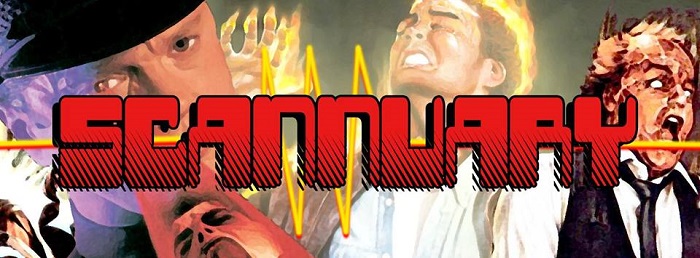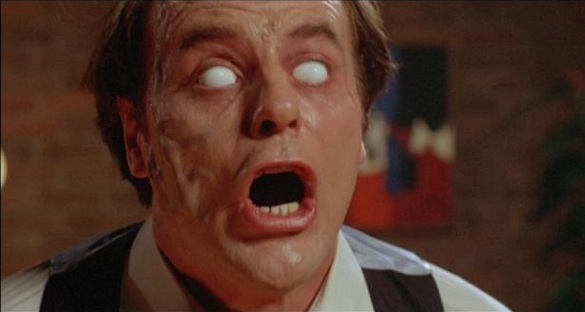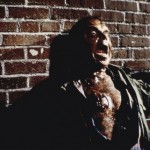
She made me do it. She made me hurt her."
Those are the words spoken by Cameron Vale (Stephen Lack), the telepathic/telekinetic protagonist of David Cronenberg's Scanners, when Dr. Paul Ruth (Patrick McGoohan) questions him about his scan attack on the woman in the mall food court early in the film. Cameron, at first a homeless derelict, is basically an adult child. Left to wander the wilderness of society, he has grown up with no workable knowledge of his powers or how to control them, let alone any idea of who he is. Not only does he have no memories of his earlier life, but he has no real personality of his own.
Filled with the voices of those around him that he inadvertently scans constantly, Cameron has never truly developed as his own person, instead feeding off his bases desire and feeding into the impressions of him given by those who encounter him. Many have looked sideways at Stephen Lack's performance and fingered it as the film's biggest flaw. It's not hard to see why, and while I agree to a certain extent, for better or worse, we were given the performance that Cronenberg wanted. Vale is supposed to be a blank slate of a human being. Taken in by Ruth, he is not only given a purpose for the first time, but incentive (i.e. Ephemerol injections) to do something with his life. To make his new "father" proud.
So are Cameron's "she was asking for it" claims about his accidental attack on the woman an excuse for his mindrape of her? Did he truly know what he was doing or was he simply a victim of his own telepathic desires? The answer is likely a bit of both. After all, there's no denying that he has no control of these abilities, but it also doesn't excuse his violent intrusion or make it any less horrifying.* The question is less about this specific interaction or other similar ones in the film, such as antagonist Darryl Revok's (Michael Ironside) mind control of his shotgun-toting goons, and more about the overall concept of the threat that such beings represent.
The rape of the mind and, to an extent, the rape of the soul.

Scanners can blow your mind. That might elicit a giggle, given the film's most infamous sequence that involves a scanner's own literal mind-blowing experience, but it's the true horror at the center of this science fiction thriller. Sure, as with most of his early work, Cronenberg's trademark body horror is present here. It is particularly highlighted in the film's two main effects sequences, as well as some juicy shotgunnings. Once one strips away the genre trappings of paranormal phenomenon and corporate espionage, however, the true focus is placed more on the mind than the body.
Scanners are strange. Scanners are different than us. Scanners are dangerous! Scanners must be stopped! While some might be good, the possibilities for insidious usage of their powers are astronomical. What's to stop a scanner from gaining telepathic control of a world leader? What's to stop a scanner from clandestinely controlling someone to commit crimes or even a high-profile assassination? What's to stop a scanner from exploding your head as you watch television, without ever having set foot in your home? Nothing. Not a damn thing can stop them from destroying the thing that most makes you special: your mind and the personality contained within it.
Do I sound like Senator Kelly? I should, because there is very much a proto-superhero film undercurrent at play here. The young novice is taken in by the elder veteran and trained for a secret war happening right under society's nose. The future of humans and scanners lies in the balance as a threat rises from within the underground scanner community in the form of a power-mad fiend with revolution and fascism on his mind. A friend once described it as Cronenberg's X-Men and it's easy to see the comparison. Ruth as Xavier, Revok as Magneto, Vale as Cyclops (or Jean Grey?), etc. Hell, Revok's plan to create a new army of scanners with which to dominate the world isn't all that different from Magneto's plan in the first X-Men film. If you ever wanted to know what a Cronenberg superhero movie would look like, look no further. This is merely the form, however. It is the archetypal vessel for David's ideas on telepathy, telekineticism, biological manipulation, and conspiratorial paranoia.
We like to think that our bodies are our own, but they aren't. They are viewed and touched by everyone around us on a daily basis, whether it is something as simple as brushing up against someone, shaking their hand, comforting a child or making love to a significant other. We share our bodies with all around us, whether we'd like to admit it or not. The only true space we have to ourselves is within our own mind. Our conscious and sub-conscious beings are the final frontier of personal privacy and the sole place we can retreat to.
Assuming scanners never become reality, of course. I'm not going to plead with you that Scanners be set aside David's other early masterpieces like The Brood, Videodrome or The Fly. Those films manage to fire on all cylinders both as visceral storytelling and smorgasbords of thought-provoking ideas. Scanners only manages to really be the latter for me, despite having a few iconic sequences that apply to the former. It never truly succeeds as a thriller and I feel that goes a long way towards explaining why quite a few view it as a "boring" entry in his body of work. The project came together at lightning speed; so fast that Cronenberg was literally working on finishing the script every day before shooting began during production. It certainly shows, but for me, the ideas and occasional provocative images outweigh almost all of the inherent flaws of the script.
Scanners is a film that I have grown to love more and more as the years have gone on and it has everything to do with the concepts and ideas at play. As well as the deliciously over-the-top performance by Michael Ironside, of course. Unfortunately, most of the sequels that followed lacked both of these elements, instead playing up the more exploitative elements of Cronenberg's original ideas. Some ideas are further developed, but if memory serves, most went for thrills above intellectual chills. We'll get to those films as the week progresses, however.
Bottom line? I love Scanners. It's not his best film, but it will always be one of my favorites. I completely understand and even agree with many of the complaints lobbed at the film, but they never can seem to put a damper on my enthusiasm for it. If that's a problem for you, well, Revok put it best…
"Alright! We're gonna do this the scanner way. I'm gonna suck your brain dry!"
*Ironside's Revok, on the other hand, shows no remorse in his own attacks on others and almost seems to get off on these acts sexually as much as he does egotistically. What a sleazy, repulsive bastard you brought to the screen, Michael!











